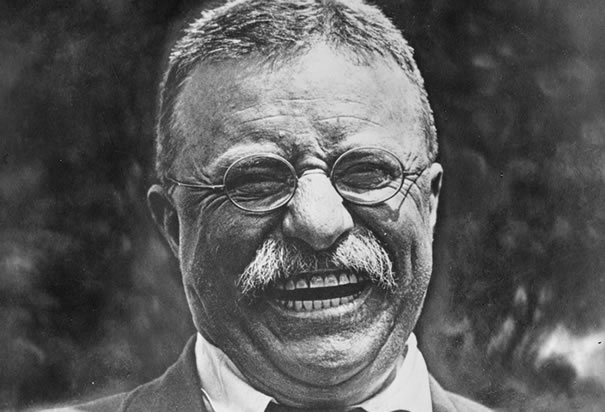
Teddy Roosevelt, spearhead of "The Progressive Movement."
Dear Mr. Will,
The progressive agenda did not begin, as you imply, with
Woodrow Wilson. (Were you on the outside looking in, you would be outraged by such liberal re-writing of history.)
As it relates to The Oval Office, The Progressive Movement began with Republican president,
Theodore Roosevelt, the first Commander-in-Chief to support universal
healthcare. http://www.pnhp.org/facts/a-brief-history-universal-health-care-efforts-in-the-us
Democrats took it upon themselves to fulfill T.R.'s vision when "Republicans" replaced The Party of Lincoln with a haphazard band of partisans whose theocratic impulses and Know-Nothing politics are, frankly, appalling.
Bill Clinton's DNC speech raises many questions. To choose just one, do you think Lincoln would have proposed photographic Voter I.D., particularly for black people?
But let's have Lincoln speak for himself. In his State of the Union Address (1861), our 16th president sets forth a
fundamental economic view that today's "Republicans" won't even circulate among themselves.
"In my present position I could
scarcely be justified were I to omit raising a warning voice against this
approach of returning despotism. It is not needed nor fitting here that a
general argument should be made in favor of popular institutions, but there is
one point, with its connections, not so hackneyed as most others, to which I
ask a brief attention. It is the effort to place capital on an equal footing
with, if not above, labor in the structure of government. It is assumed that
labor is available only in connection with capital; that nobody labors unless
somebody else, owning capital, somehow by the use of it induces him to labor.
This assumed, it is next considered whether it is best that capital shall hire
laborers, and thus induce them to work by their own consent, or buy them and
drive them to it without their consent. Having proceeded so far, it is naturally
concluded that all laborers are either hired laborers or what we call slaves.
And further, it is assumed that whoever is once a hired laborer is fixed in
that condition for life. Now there is no such relation between capital and
labor as assumed, nor is there any such thing as a free man being fixed for
life in the condition of a hired laborer. Both these assumptions are false, and
all inferences from them are groundless. Labor is prior to and independent of
capital. Capital is only the fruit of labor, and could never have existed if
labor had not first existed. Labor is the superior of capital, and deserves
much the higher consideration." Read more: State of the Union
Address: Abraham Lincoln (December 3, 1861) — Infoplease.com
Tell a friend. (If you dare.)
Attentively,
Alan Archibald
PS While on the topic of "activist government," have you given thought to Ben Franklin's view of
taxes?
Benjamin Franklin to Robert Morris
25 Dec. 1783
"The Remissness of our People in
Paying Taxes is highly blameable; the Unwillingness to pay them is still more
so. I see, in some Resolutions of Town Meetings, a Remonstrance against giving
Congress a Power to take, as they call it, the People's Money out of their
Pockets, tho' only to pay the Interest and Principal of Debts duly contracted.
They seem to mistake the Point. Money, justly due from the People, is their
Creditors' Money, and no longer the Money of the People, who, if they withold
it, should be compell'd to pay by some Law.
All Property, indeed, except the Savage's
temporary Cabin, his Bow, his Matchcoat, and other little Acquisitions,
absolutely necessary for his Subsistence, seems to me to be the Creature of
public Convention. Hence the Public has the Right of Regulating Descents, and
all other Conveyances of Property, and even of limiting the Quantity and the
Uses of it. All the Property that is necessary to a Man, for the Conservation
of the Individual and the Propagation of the Species, is his natural Right,
which none can justly deprive him of: But all Property superfluous to such
purposes is the Property of the Publick, who, by their Laws, have created it,
and who may therefore by other Laws dispose of it, whenever the Welfare of the
Publick shall demand such Disposition. He that does not like civil Society on
these Terms, let him retire and live among Savages. He can have no right to the
benefits of Society, who will not pay his Club towards the Support of it."

- George F. Will
- Opinion Writer
Obama: the real radical
CHARLOTTE
Four years ago, Barack Obama was America’s Rorschach test, upon whom voters could project their disparate yearnings. To govern, however, is to choose, and now his choices have clarified him. He is a conviction politician determined to complete the progressive project of emancipating government from the Founders’ constraining premises, a project Woodrow Wilson embarked on 100 Novembers ago.
558
Comments